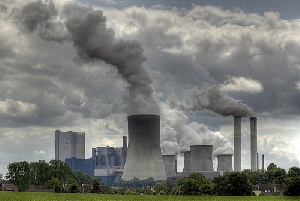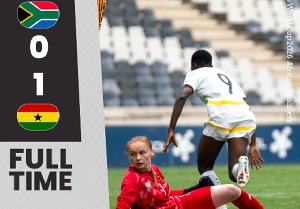Just a few weeks after Ghana’s Power Minister Dr Kwabena Donkor announced that the country has started exploring the option of using clean coal technology to augment power production in the energy-deficient country, a new report released this week ahead of a global climate summit in Paris has warned that up to $2trillion in petroleum and coal projects will not be needed if the world takes action to limit warming of the planet to 2ºC.
Ghana’s $1.5-billion coal-fired power plant project is being undertaken by Chinese-owned company Shenzhen Energy Group, parent company of local Independent Power Producer Sunon-Asogli Power.
The Ghanaian power Minister, who is racing to fulfill a promise to end a three-year power crisis by the end of 2015, recently told stakeholders of the power sector at a 'Strengthening Public-Private Partnerships in the Electricity Sector' conference organised by the International Finance Corporation and Millennium Development Authority in Accra that: "This country is also moving on a new trajectory, which is that hydro is increasingly becoming a minor player in the generation mix; and, therefore, going forward other generation sources that are more expensive than hydro will have to become the dominant generation source: but Ghana has a responsibility to remain competitive; we are looking at the introduction of clean coal energy to address future needs while the renewable sector builds up."
The conference was also in collaboration with the Global Sustainable Electricity Partnership. The Minister said a Public Private Partnership (PPP) arrangement is being considered and that the Volta River Authority (VRA) and China’s Shenzhen Energy Group are currently undertaking pre-feasibility studies on the coal project; it is estimated to cost about US$1.5billion to build a 700-megawatt coal-fired plant after feasibility studies yielded positive results.
The project is expected to include two units of 350 megawatts, and a subsidiary coal port with a 50,000-tonne berth as a terminal to receive coal from overseas and transmit it to the plant.
Construction could take between 30 to 36 months, or even longer, depending on local conditions and available resources in the country. Ghana currently has an output capacity of 2,125MW and has plans to increase this to 5,000MW by 2016.
But the latest global warming report, according to miningweekly, adds to a string of studies warning investors that measures to curb carbon emissions will hit earnings at coal, oil and gas companies as the world shifts to cleaner energy.
Analysing industry databases, environmental think tank Carbon Tracker Initiative (CTI) found the three biggest losers would be Mexico's Petroleos Mexicanos (PEMEX), with $77-billion in unneeded projects, Royal Dutch Shell, with nearly the same, and ExxonMobil with $73-billion in potentially stranded projects. Petroleum companies are worse off than coal companies as their projects are typically much more expensive, it said.
From the point of view of cutting carbon emissions, coal producers are much more vulnerable as the carbon saved by not developing their projects is much greater, Carbon Tracker said.
However, from an investor viewpoint, oil companies faced a higher risk given the greater cost of their projects, said Mark Fulton, a former investment banker who worked with CTI on the research. He pinpointed two "carbon basins" – oil sands in Canada and the Galilee Basin in Australia, where two Indian conglomerates are looking to dig mines – as regions whose assets will not be needed. In a separate report released on Monday, another non-profit think tank, CDP, ranked Glencore Plc as the worst prepared for a low-carbon economy among 11 major listed miners, based on measures including energy efficiency, resilience to water shortages, exposure to coal and carbon price exposure. Glencore said it was disappointed with the findings and said its climate change scores from CDP had improved over a number of years, beating the industry average in an earlier CDP report.
Energy expert Dr Charles Wereko-Brobbey recently warned that Ghana's plan to go into coal power production is not only "premature," but also "cannot be justified." "You cannot be promoting carbon credits and at the same time contributing to huge emissions of carbon," the former CEO of state power producer Volta River Authority (VRA) said Thursday.
According to him, even though there is clean coal technology, "the cost of achieving clean coal is probably more expensive than generating with thermal."
He told Joy FM that coal is not what Ghana needs to end the current power crisis. "That will not end 'dumsor' (erratic power supply) at the end of this year."
"We are only at a memorandum of understanding stage, if you are talking coal as a solution; as you say they are, look ten years down the line. So, in the context of: 'Can it end 'dumsor'?' No [it can’t], and there must be some other reason why people are in a rush to do coal," he said.
Business News of Wednesday, 25 November 2015
Source: classfmonline.com













